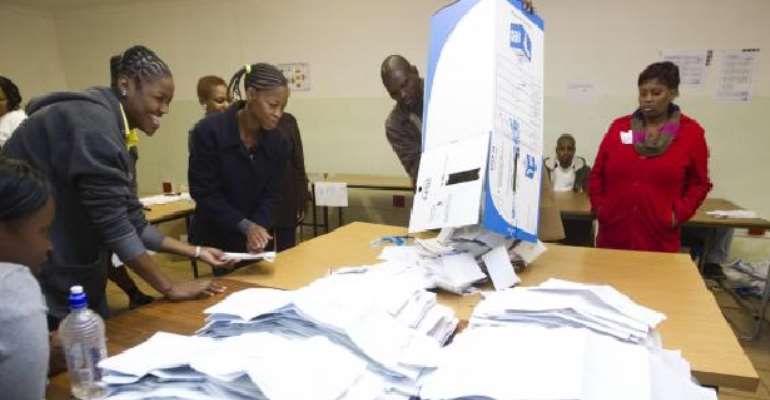South Africa's ANC Rolls To Victory, Ultra-Leftists Routed

The ruling African National Congress (ANC) took a clear lead on Thursday in South Africa's fifth post-apartheid election, giving President Jacob Zuma the political clout to push through pro-business reforms in the face of union and leftist opposition.
Burdened with sluggish economic growth and damaging strikes in his first term, the scandal-plagued Zuma has devoted less and less time over the last year to the wishes of unions, whose long walkouts have hit confidence in Africa's most developed economy.
He has also batted away opposition from the far left, squelching some expectations the Economic Freedom Fighters (EFF) - led by his former protégé Julius Malema - would ride a wave of populist anger over grinding poverty and high unemployment.
'With this (election outcome), he is much less beholden to the left,' Cape Town-based political analyst Nic Borain said, and he expected Zuma to appoint a technocrat cabinet with the express mandate to roll out policies to boost growth.
'There's no deeply insightful change, but the bottom line is that by 2019 they are going to have to be growing this economy and making sure they can still raise tax revenue.'
Zuma hinted this week that the ANC needed to take a more pro-business tack, accusing the main platinum union of irresponsibility for dragging out a four-month wage strike, and he hinted at reforms in the pipeline.
'We need an overwhelming majority so that we can change certain things so that we can move faster,' Zuma told a news conference. 'There are things you need to remove so you can move faster. I won't be specific.
The ANC, the liberation movement that swept to power two decades ago under the leadership of Nelson Mandela, had 62.5 percent of the vote with just over half of districts counted, the Independent Electoral Commission (IEC) said.
Its nearest rival, the Democratic Alliance, held 23.3 percent, upholding poll predictions the party would improve on the 16.7 percent it won five years ago as it gradually sheds its image as the political home of privileged minority whites.
The militant EFF, launched by Malema after he was expelled from the ANC in 2012, was in third place with 4.7 percent.
ANC MEMBER SHOT
Turnout was high across 22,000 polling stations nationwide, officials said, and voting passed off smoothly although the ANC said one of its members was shot dead outside a polling station in rural KwaZulu-Natal, Zuma's home province.
Polls ahead of the election, the first to feature voters born after apartheid, had put ANC support near 65 percent, a touch below the 65.9 percent it won in the 2009 vote that brought Zuma to power.
The rand firmed 1 percent to 10.35 against the dollar - its strongest level this year - as the ANC's margin of victory became clear. The benchmark Top-40 stock index was little changed.
The ANC's enduring popularity has confounded those who had expected its support to wane as the glory of its past receded into history and voters focused instead on the sluggish growth and slew of scandals that have typified Zuma's first term.
Africa's most sophisticated economy has struggled to recover from a 2009 recession - its first since 1994 - and the ANC's efforts to stimulate growth and tackle 25 percent unemployment have been hampered by the unions.
South Africa's top anti-graft agency accused Zuma this year of 'benefiting unduly' from a $23 million state-funded security upgrade to his private home at Nkandla in KwaZulu-Natal that included a swimming pool and chicken run.
Zuma has denied any wrongdoing and defended the upgrades as necessary for the protection of a head of state. He confidently told reporters on Monday that the Nkandla controversy was 'not an issue with the voters'.
His personal approval ratings have dipped this year, but Zuma appeared relaxed and assured as he voted at a school near Nkandla, ending what he called a 'very challenging' campaign.
'I hope that all voters will cast their votes free,' he told reporters. 'This is our right that we fought for.'
REUTERS
